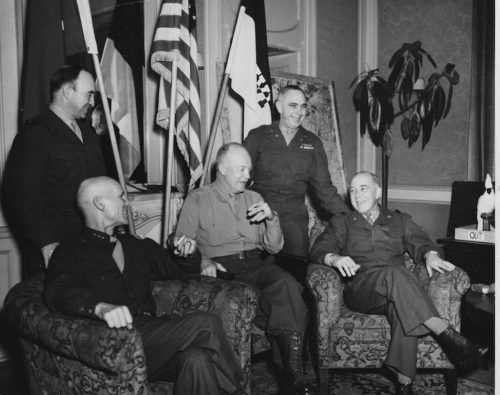
Maj. Gen John B. Anderson on far right plays host to Generals William H. Simpson and Dwight D. Eisenhower on March 23, 1945. Photo courtesy of Michael M. Van Ness
By Michael M. Van Ness
From humble beginnings in Parkersburg, Iowa native John B. Anderson ascended the U.S. Army hierarchy. Promoted to Major General, we resume Anderson’s two-part story for Iowa History Journal as Anderson commands troops in Germany during World War II.
March 23, 1945
Maj. Gen. John B. Anderson commands the U.S. Army’s XVI Corps, the tip of the spear of the U.S. Ninth Army ready to thrust into the heart of Germany. In a firm voice, he orders the Artillery Chief of Section to “commence fire.” Multiple cannons fire, round after round, nearby and in the distance. The blasts soon blend into one continuous rumble. Anderson, an old field artillery officer, knows 2,500 U.S. artillery pieces mean death and destruction for the Germans who are dug-in on the far shore of the Rhine River. As night falls, the sky seems to be on fire. The bright muzzle flashes mimic an Iowa summer storm. But it wasn’t summer, and it wasn’t Iowa.
Maj. Gen. Anderson’s XVI Corps will lead the assault over the Rhine River. He has been busy for weeks orchestrating the full fury of the XVI Corps. By the 23rd, Anderson’s XVI Corps has swelled to the size of a full-blooded American army. He’s been given every available resource for the crossing. Still, it’s a dangerous undertaking. From his youth in Parkersburg, Anderson knows the dangers of Iowa spring flooding. For now, the Rhine River runs fast and wide, in full flood. More importantly, the Germans are desperate to protect the Fatherland. As Americans learned at the Battle of the Bulge, desperate men are dangerous men.
With the end of the war seemingly so near, no American wanted to be the last casualty. The ordinary soldier looked to the artillery to soften resistance and destroy the Germans’ will to resist. Operation Flashpoint is the code-name for the artillery phase of the Rhine crossing. With air supremacy assured, Operation Flashpoint concentrates artillery out in the open without fear of Luftwaffe attacks. With the Port of Antwerp open for re-supply, Operation Flashpoint expends huge quantities of shells. With air supremacy and mass artillery bombardment, Anderson hopes Operation Flashpoint will minimize American casualties.
Anderson sleeps fitfully. National prestige, the lives of his men and his own reputation are at stake. Should he stumble, the chance to lead men into combat will not come again. He takes comfort knowing his staff at XVI Corps headquarters have been tireless in their efforts. His plans have been reviewed and approved by his boss, Lt. Gen. William H. Simpson, Commanding General of the U.S. Ninth Army. Simpson is confident enough to give Anderson full authority to cross the Rhine River with the men of the U.S. 79th and 35th Infantry divisions at dawn on March 24.
TO READ THE ENTIRE STORY AND OTHER FASCINATING STORIES ABOUT IOWA HISTORY, subscribe to Iowa History Journal.
